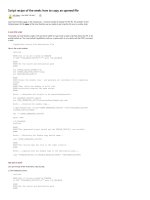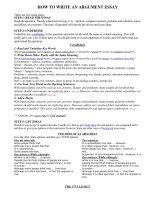How to organize an event
Bạn đang xem bản rút gọn của tài liệu. Xem và tải ngay bản đầy đủ của tài liệu tại đây (36.48 KB, 5 trang )
How to Organize Your Event
1. Initial Planning
Here are initial questions as you begin to plan a reuse collection event.
❐ What type of event will you hold?
❐ When will you hold the event?
❐ What event tasks can you carry out and what tasks will you need to contract for services?
❐ How much will the event cost you?
❐ How will you pay for the event, or get others to help you?
❐ What is the schedule for event preparation?
❐ What will be your measure of success for the event (e.g., quantity of material, number of participants,
etc.)?
A three-month time frame should allow you to plan and coordinate a smooth event. Local government
decision-making processes can sometimes add to the time needed at the beginning of your planning
process. If you are working in partnership with others, some planning time should be devoted to sorting
out roles and responsibilities, including funding, BEFORE initiating other planning details.
2. Determine Type of Event
❐ Host a drop-off event – one-time or periodic.
❐ Add items to an existing household hazardous waste drop-off event, such as a spring/fall cleanup day
❐ Allow for ongoing, permanent drop-off at existing recycling, solid waste transfer or household
hazardous waste facilities
❐ Determine which materials you will collect (e.g. books, furniture, clothing, bicycles, scrap metal, etc.)
3. Budget and Funding
What does an event cost?
A reuse and recycling event has three basic costs centers. Your ability to make use of donated time or
resources – labor, equipment, advertising or site access – can have a significant impact on your event
costs.
1) Public education and outreach – how you publicize the event
2) Operations costs – costs include labor, equipment and supplies, and perhaps site rental
3) Transportation costs – costs for transportation of materials that are donated, usually billed per
mile/hour, including driver labor charges and shipping supplies (Note: Many charities and scrap vendors
do not charge these costs to a municipality. It is worth investigating ahead of time if there will be a
charge.)
Other things to consider:
❐ Are volunteers available to work the day of the event?
❐ Is a regional event possible? (Costs could be split amongst several communities if you hold a regional
event).
Covering Event Costs
❐ Charge a fee for those that drop off items at an event that will cost the municipality to recycle (e.g.
electronics and household hazardous products), which could cover all or part of the applicable costs
❐ Use government funds (from property tax, waste or recycling fee revenue) to cover all or part of costs
❐ Use in-kind contributions from government and private sources to cover costs (publicity, labor,
equipment)
Tasks to Complete Before the Event
Once you’ve made the decision to hold a reuse and recycling collection event and have developed a
project budget, there are a number of specific elements to address leading up to the event
1. Pick the Location for Your Event
Your location decision should address several factors:
❐ The location should be reasonably well known in the community, or at least fairly convenient to people
you want to participate.
❐ The site should have good street access, so people can easily enter the site without creating backups or
delays. Avoid sites that have only one point of entry, or require people to make left turns on busy streets.
❐ The space or parking lot should be large enough to safely accommodate traffic, recycling equipment
and event staff.
2. Get Permission to Hold the Event
Early approval for an event should be a top priority in your planning efforts. Delays in approval can mean
fewer publicity opportunities due to compressed time lines, thus lowering the turnout and the overall
success of the event. Establish good communications with the property owner, occupant or manager.
Provide them with good information about the event and what to expect.
❐ Identify who will be the person to “make the call” for using a site. For example, is it a school principal
or will the school district need to sign off on using a school parking lot?
❐ Call and review the event objectives. Address all of their questions and concerns.
❐ Be prepared to answer questions about your event – who, what, when, where, why & how.
Have information about events that have been done elsewhere.
❐ Check with your municipal officials about insurance requirements.
❐ Check with municipal offices – usually the Planning, Health or Public Works Department – to
determine needed permits (event, sign or tent permits).
❐ Call Paul Emond (617-292-5974) or Jamie Doucett (617-292-5868) to report date and location of your
reuse event if it will include collection of bulky items that will be sent for disposal.
3. Select Reuse and Recycling Organizations
❐ Identify organizations and businesses that will accept the materials you’re collecting.
❐ Determine what services you would like the recycler to provide (labor, equipment, transportation
and recycling), including any specific environmental management needs, such as domestic
disassembly (for consumer electronics)
❐ Solicit proposal, or bids, from companies to provide the full range of services
❐ Determine short-list based on cost, experience and environmental performance
❐ Check references and previous contracts for companies on the short list
❐ Select company that provides the best value in terms of your program goals
❐ Arrange for trash container for items that can’t be reused or recycled.
4. Consumer Education and Outreach
A successful reuse and recycling event requires an extensive effort to inform consumers about the reuse
opportunities and the specifics of your collection event. The amount and type of advertising you choose
to do can have a significant effect on the number of participants in your event. Provide enough
information for participants to understand what they need to do. Inadequate information can discourage
participation or inundate you with calls.
❐ Event location (an easily recognizable location is best)
❐ Dates and times for the event
❐ Products accepted and NOT accepted
❐ Whether there will be any user fees
❐ Contact information for more information
Spreading the word about your event: Some publicity options include:
❐ Handouts at local stores and other sites, such as household hazardous waste collections
News media outreach to gain access to local news reporting
While unpredictable, local news coverage can give you broad exposure for a relatively small low cost. An
announcement coming from a civic leader has a much better chance of gaining the attention of the local
news community.
❐ Print, radio and television advertisements
❐ Announcements in local recycling newsletters(including electronic newsletters and websites),
prepared by city or county recycling offices
❐ Special inserts in bills (water, utility or solid waste bill)
❐ Press releases and calls to local media to generate news reports
Timeline and Schedule
This basic timeline will help you develop a schedule and keep in mind all of the activities that must be
done during your event planning. If your event represents a partnership – a group of municipalities or
non-profits – the schedule you develop may require additional time to allow for needed cooperation.
Three Months Before the Event
❐ Determine type of event, participants (residents, businesses), and dates and times
❐ Seek partner commitments to support event
❐ Decide which items you will collect
❐ List specific collection, sorting, processing activities needed for the event
❐ Determine activities you will carry out and activities you will rely on reuse or recycling
organizations to do.
❐ Research permit requirements
❐ Determine type of publicity you will use to promote your event.
Two Months Before the Event
❐ Finalize site location choice and ensure all necessary permission is in place
❐ Select reuse organizations
❐ Arrange any additional recycling services – batteries, cardboard or paper recycling
❐ Finalize details of publicity and advertising materials (locations, times, dates)
❐ Send out notices and information with long lead times (newsletters, bill inserts)
❐ Create on-site signs or handouts to those recycling participants
One Month Before the Event
❐ Confirm data collection needs for measurement and reporting
❐ Recruit volunteer staff, if necessary, and provide guidance on event (e.g., what to wear, traffic
control, hours, etc.)
❐ Confirm insurance coverage is in place
❐ Contact local police department and traffic control authorities, as necessary
❐ Distribute initial consumer notices about recycling
❐ Send advertising and other publicity copy and art, as necessary
One Week Before the Event
❐ Reconfirm all staffing, equipment, reuse and recycling service arrangements
❐ Ensure event staff have access to water and rest rooms
❐ Make arrangements for collecting fees, if necessary (staff, petty cash, security)
❐ Get supplies – traffic cones, tape, tools, refreshments
❐ Send out press release and contact local reporters several days before event
Day Before/Day of the Event – Your Final Planning Tasks
❐ Follow up on advertising and promotions, contact local news outlets
❐ Prepare site early with reuse and recycling organizations and other on-site staff
❐ Re-connect with property management before event begins; exchange contact information and
establish protocol for addressing unexpected issues
❐ Coordinate and manage on-site staff (estimate is 6-10 staff for events of 150-200 cars served)
❐ Greet participants and interested constituents or supporters
❐ Collect data, including how much of each material was collected and participants and any
survey information, in order to document your event to help with future funding and support
Post-Event Tasks
1. Communication with Partners
After the event is complete, it is good to communicate with all parties involved in the event.
❐ Send letters to each participating organization to thank them for their cooperation and help in
carrying out the event.
❐ Establish time frame for the reuse and recycling organizations to report back to you on types
and quantities of material collected during the event.
2. Report to the Public
Create a public report including the basics, such as those outlined below. A public report will help the
general public and decision makers within your organization understand what happened at the event and
can assist planning, funding requests, cost assessments and other analysis for future events.
❐ Brief description of program objective of the event
❐ Dates and locations of the event
❐ Number of participants
❐ Types and quantities of materials collected
❐ Contact information for those seeking more detailed information about the event
❐ Draft a press release publicizing the results of your event. Use the opportunity to help the
public see how much waste was reused or recycled.









